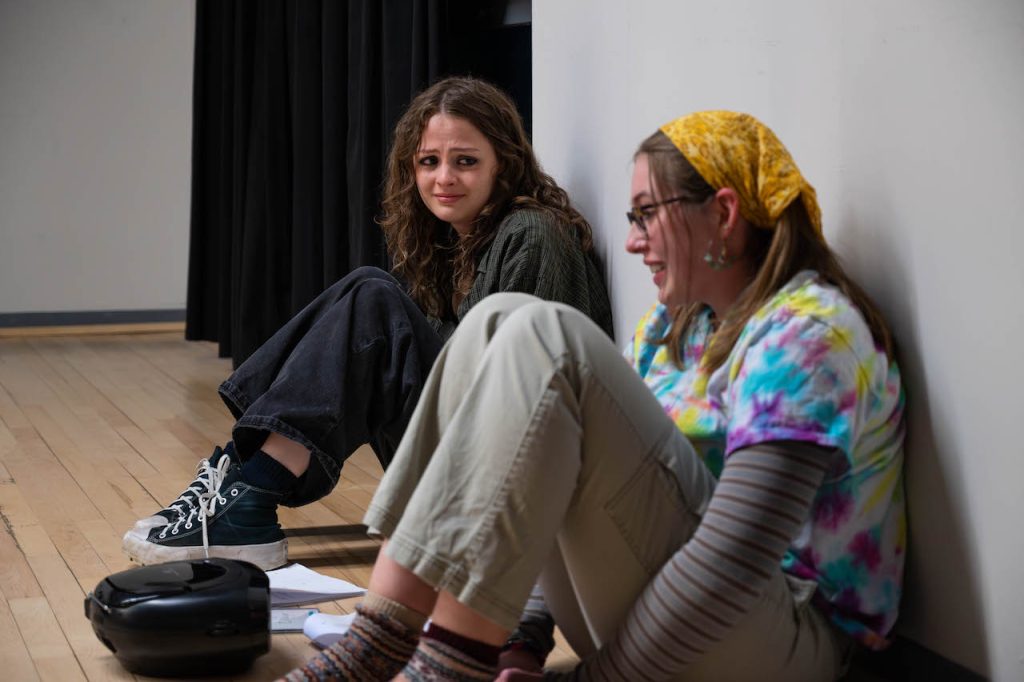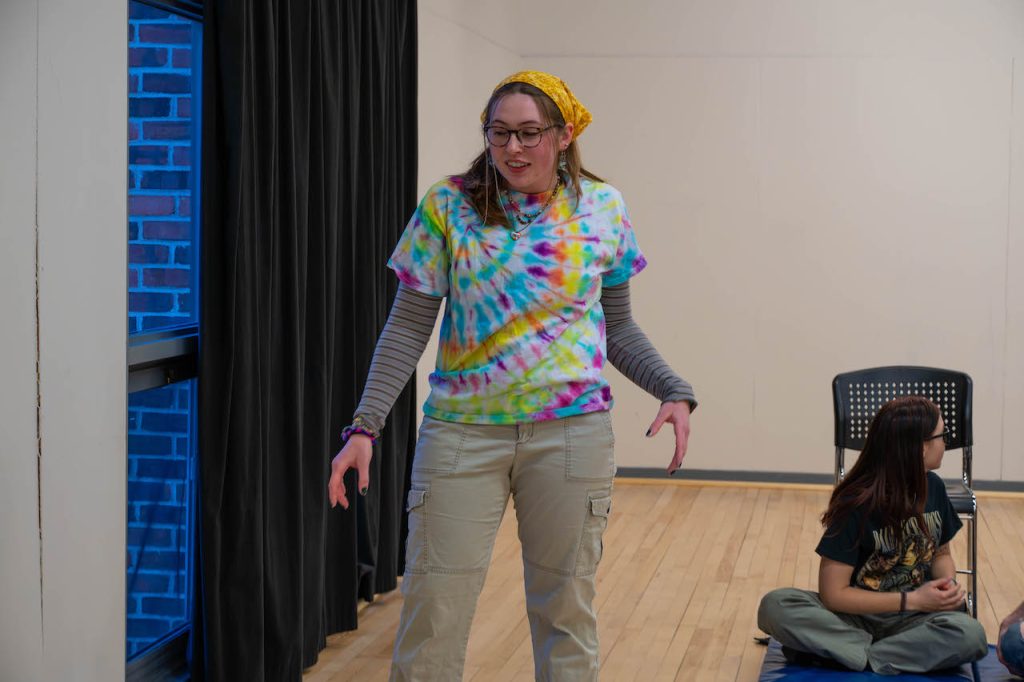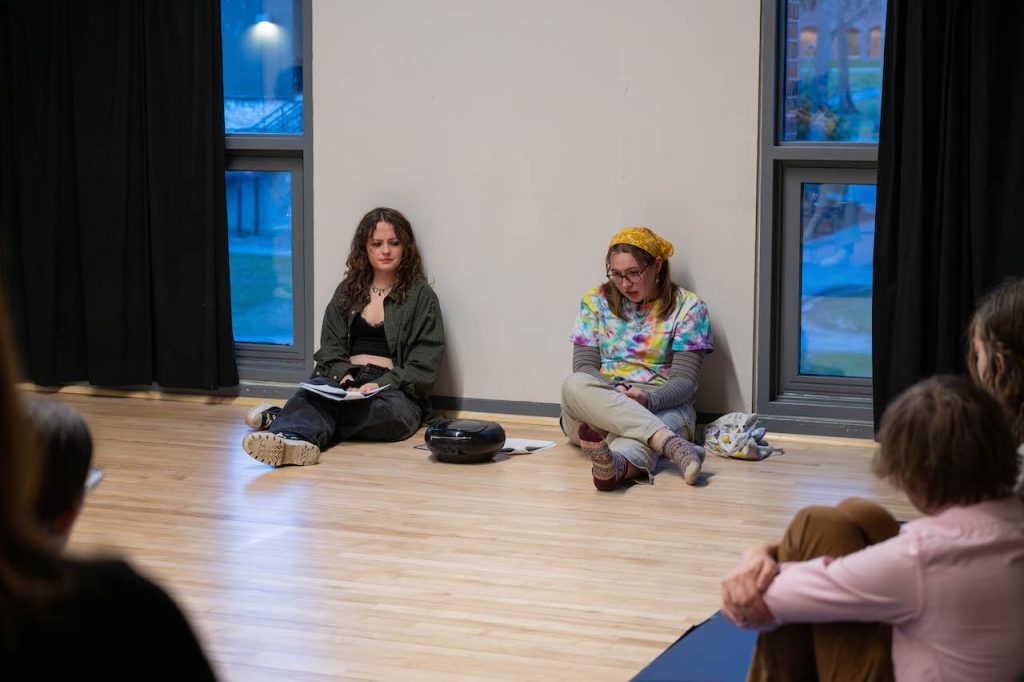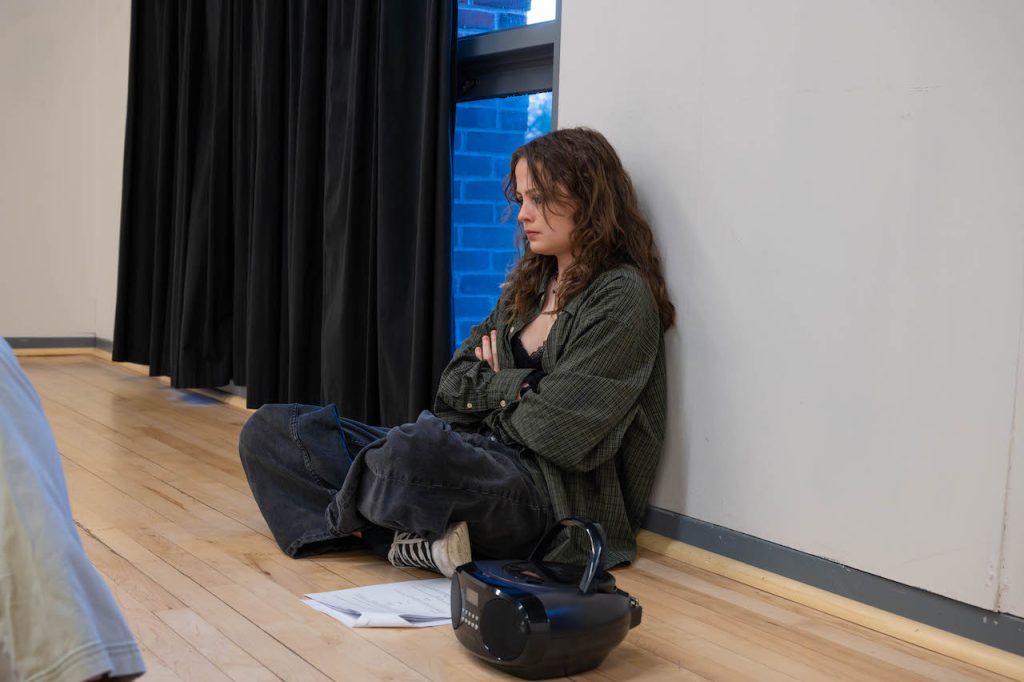BY MOXIE MILLS ’27
Audrey Tignor’s (‘27) virtuosic Songs in C Major at the End of the World is a play that I feel deeply grateful to have seen. The show, which played in Studio B on February 20th and April 21st, gives viewers a peek into the conversations that two people can have when they have nothing left. Written and directed by Tignor and stage managed by the lovely Meghan Wax (‘27), is beautifully lit and perfectly scored.
Ally Stanton (‘27) and Lila Sandler (‘27) played Jean and Jessie, two people seeking shelter during an apocalypse. Stanton’s character, Jean, had a pessimistic exterior that hid a deep loneliness within. Sandler’s character, Jessie, was a hopeful and whimsical individual.

Tignor was obscure about the nature of the apocalypse. All viewers know is that everyone is dying and the wind is loud. This leaves the story focused on Jean and Jessie’s final moments, and not the complexities of a global catastrophe. Music was central to the story–it is, quite literally, the titular character. As Jessie and Jean embraced their fate, music comforted them, held them, and forced them to connect with each other.
The play opened with Jean sitting on the floor, arms crossed, looking bored and irritated. Jessie, meanwhile, was doing a passionate interpretive dance to “Arthur’s Theme (Best That You Can Do)”. Jessie sang along to the lyrics with emotion plain in their face. While Sandler’s dancing is hard to ignore, I found Stanton’s disgruntled eye rolls and frustrated sighs to be just as captivating. These two understood their characters perfectly. When the song ended, Jean begged Jessie to turn the music off–or at least play a different song. Jean angrily insisted, Jessie playfully deflected. This dynamic is present throughout the show, but this opening scene does a wonderful job of setting up viewers’ expectations.
Jean, in their desperation for peace and quiet–and respite from Christopher Cross, no doubt–declared their misery and said that “it would be better to die alone”. Here, we see Jessie drop their happy-go-lucky facade and acknowledge the horror of their shared circumstances. Sandler displayed this fear in a very raw, honest way. Jean saw Jessie’s discomfort and quickly apologized and tried to change the subject; Jessie refused to move on because now it’s “out there”. The two agreed to be friends, or something like it, for the next hour.

Of course, they weren’t not strangers to each other. The audience learned that they went to high school together, but never became particularly close. Ice breaker, first day of class style conversation ensued. They talked about siblings, about favorite movies. It’s comforting to see that even in a person’s last day on earth, the topic of favorite movies never fails to excite. Jessie started to play more music–the titular mixtape, songs in C major. Jean asked why this mixtape existed; Jessie explained that it was for a college project about how different keys represent specific emotions. C major, apparently, symbolized nostalgia. While Jessie called the essay “bullshit”, the music that played did have a consistently nostalgic tone, which was fitting for the backdrop of two people contemplating their lives ending.
It came up again–death. Jean earnestly asked Jessie about how they feel regarding the end of the world. Jessie didn’t know how they felt. Jean didn’t know what would happen after everyone died. And then, with uncertainty and fear still thick in the air, the two swiftly changed the subject. It was the consistent jumping between topics to skirt around the hard conversations that audiences can really relate to. Sometimes I want to talk about the fascist dictator ruining our country, but sometimes it’s too hard and I would rather talk about how excited I am for lunch.
Jean and Jessie started talking about why they were both in their high school gymnasium during the apocalypse. Jessie admitted that they have been living in the school gym for months, since before they knew that everyone was going to die. Jean’s curiosity about Jessie’s circumstances felt genuine, not ironic–we saw their opinion of Jessie shift as time ran out. Then the two discussed the places they would want to die in, and Jean gave a top five list–something silly, playful, and very Jessie-inspired. Being in this situation forced them to adapt to each other’s idiosyncrasies.
When Jean admitted that they would love to die while sitting on the top of a tall statue, Jessie mocked them for saying it would be “beautiful” up there. Jean’s feelings seemed genuinely hurt and Jessie seemed legitimately sorry.
They broached the subject of college. Jessie told Jean that they left UCLA after a month. Jean said that’s “pathetic”. The tension was back. Jessie was defensive and argued that they don’t want to waste their life doing things that they don’t care about. The conversation devolved and Jean accused Jessie of being judgmental and pushy. Jessie accused Jean of trying to make everyone hate them. They started screaming at each other, Jessie desperate for normal conversation as distraction from reality, Jean pleading for quiet.
Jean then admitted that they came to Wheaton North to end their own life before the apocalypse. They only knocked on the door of the gym to ask whoever was inside to turn the music off. It was a vulnerable moment–Sandler’s reaction to this admission was gentle and beautiful. Jean didn’t want to talk about it further and asked Jessie to turn the music back on.

Jean cautiously said that they think they might be a bad person and Jessie vehemently denied it. Contrast is palpable in this scene– after Jean complained of their apathy, Jessie told them that feeling everything was just as hard.
It got quiet for a bit. Then Jean asked Jessie what they did when they found out about the world ending. Jessie explained that they created rules, like having to go on a walk every day, in hopes that following the rules would keep everyone alive. I would argue that this is one of the most vulnerable lines that Sandler delivers in the entire show–Jessie, someone who lives life on the edge and doesn’t seem to play by anyone’s rules, became so afraid of dying that they let rules control them. Jessie then asked Jean why they came into the gymnasium when Jessie opened the door. Jessie chose rules to relax before the apocalypse, and Jean, who seems to push every other person away, chose the comfort of being around another person.
I found this entire section of the play to be deeply moving. When disaster strikes, people do anything to feel safe, even if it means betraying who they truly are. Or maybe, Jessie and Jean became who they were meant to be by making these choices.
Jean mentioned that they didn’t want to be at home during the apocalypse. This, in both runs of the show, made me tear up. Jean didn’t want to see their family die–it was scarier than the thought of dying themself. This is my favorite line in the show, as it evoked such raw emotion from everyone in the audience each time.

Jean acknowledged that they were glad someone else was there with them for the final moments. Beautiful. Then the two talked about the things they will miss most–for Jessie, it was watching other people fall in love; for Jean, it was running errands with the people they love. The two agreed that they won’t miss fear–fear of any kind, but for Jean in particular, the fear that they sucked the life out of a room. Jessie then said that they don’t like how “there’s no point to hope anymore”. Jean said that they have found a beautiful ending in spite of the fear and the pain. I get this. I think that if I knew I were going to die, I would like to spend my last moments talking to someone, to make the experience a little less lonely.
They realized that time is almost up. They thanked each other for being there, for being alive. Phoebe Bridgers’ “I Know The End” drifted out of the jambox. (The entire crowd did a collective intake of breath when this song starts playing).
And then, with tears in their eyes, the two decided to go outside. While Jessie said there’s no point in hope anymore, I believe that there was really no point in hiding anymore. They’d been vulnerable in every sense of the word, and now it was time to accept what was coming. They held hands for comfort and slowly walked towards the door. Jessie surmised that the walk might finally do the trick, and Jean reassured that it probably would. Phoebe Bridgers sang about a slaughterhouse and an outlet mall. The door opened. The show ended.
This show was wonderfully acted, written, and scored. It undeniably came into our lives at the perfect time. Things are so uncertain right now, and people are incredibly scared. This show was a reminder that no matter how bad it gets–even if the world is ending and you are sitting on dirty gym mats–there are good people. There are good conversations. And life, no matter how scary it can get, is always worth living.
Photos by Logan Waugh
***
Moxie Mills ’27 is a staff writer for the Skidmore Theater Living Newsletter
